小学英语情态动词完整版
- 格式:docx
- 大小:54.55 KB
- 文档页数:6
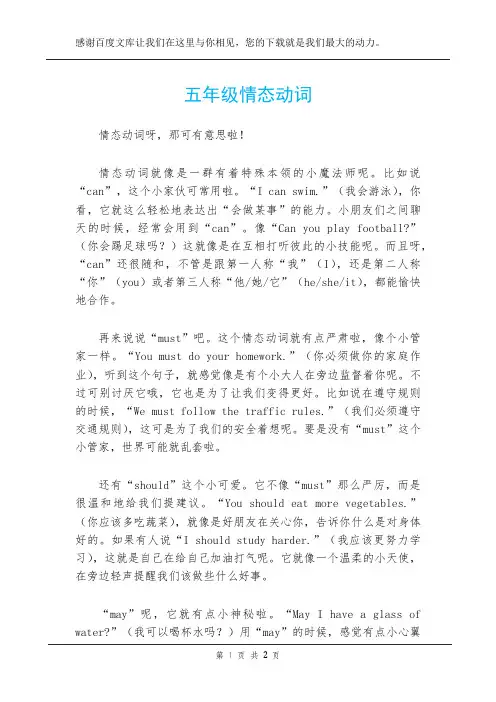
五年级情态动词情态动词呀,那可有意思啦!情态动词就像是一群有着特殊本领的小魔法师呢。
比如说“can”,这个小家伙可常用啦。
“I can swim.”(我会游泳),你看,它就这么轻松地表达出“会做某事”的能力。
小朋友们之间聊天的时候,经常会用到“can”。
像“Can you play football?”(你会踢足球吗?)这就像是在互相打听彼此的小技能呢。
而且呀,“can”还很随和,不管是跟第一人称“我”(I),还是第二人称“你”(you)或者第三人称“他/她/它”(he/she/it),都能愉快地合作。
再来说说“must”吧。
这个情态动词就有点严肃啦,像个小管家一样。
“You must do your homework.”(你必须做你的家庭作业),听到这个句子,就感觉像是有个小大人在旁边监督着你呢。
不过可别讨厌它哦,它也是为了让我们变得更好。
比如说在遵守规则的时候,“We must follow the traffic rules.”(我们必须遵守交通规则),这可是为了我们的安全着想呢。
要是没有“must”这个小管家,世界可能就乱套啦。
还有“should”这个小可爱。
它不像“must”那么严厉,而是很温和地给我们提建议。
“You should eat more vegetables.”(你应该多吃蔬菜),就像是好朋友在关心你,告诉你什么是对身体好的。
如果有人说“I should study harder.”(我应该更努力学习),这就是自己在给自己加油打气呢。
它就像一个温柔的小天使,在旁边轻声提醒我们该做些什么好事。
“may”呢,它就有点小神秘啦。
“May I have a glass of water?”(我可以喝杯水吗?)用“may”的时候,感觉有点小心翼翼,很有礼貌的样子。
就像是在请求别人的许可,让人觉得很有教养。
而且“may”还有可能表示“也许”的意思哦,像“It may rain tomorrow.”(明天也许会下雨),这就像是在猜测未来会发生什么有趣的事情。
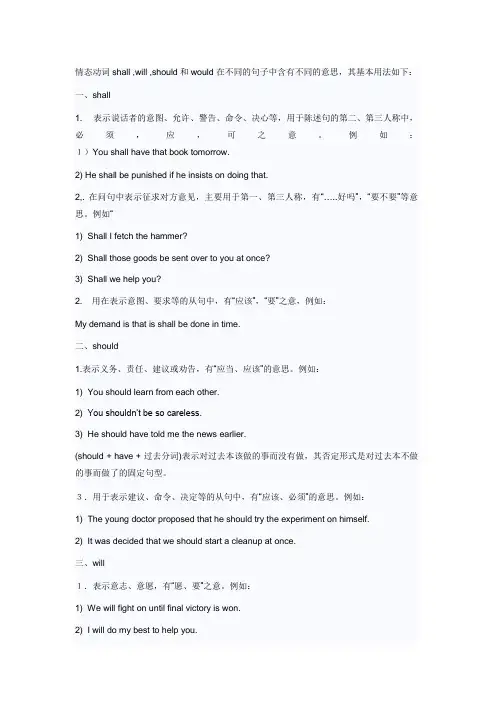
情态动词shall ,will ,should和would 在不同的句子中含有不同的意思,其基本用法如下:一、shall1. 表示说话者的意图、允许、警告、命令、决心等,用于陈述句的第二、第三人称中,必须,应,可之意。
例如:1)You shall have that book tomorrow.2) He shall be punished if he insists on doing that.2,. 在问句中表示征求对方意见,主要用于第一、第三人称,有“…..好吗”,“要不要”等意思。
例如“1) Shall I fetch the hammer?2) Shall those goods be sent over to you at once?3) Shall we help you?2. 用在表示意图、要求等的从句中,有“应该”,“要”之意,例如:My demand is that is shall be done in time.二、should1.表示义务、责任、建议或劝告,有“应当、应该”的意思。
例如:1) You should learn from each other.2) You shouldn’t be so careless.3) He should have told me the news earlier.(should + have + 过去分词)表示对过去本该做的事而没有做,其否定形式是对过去本不做的事而做了的固定句型。
3.用于表示建议、命令、决定等的从句中,有“应该、必须”的意思。
例如:1) The young doctor proposed that he should try the experiment on himself.2) It was decided that we should start a cleanup at once.三、will1.表示意志、意愿,有“愿、要”之意。
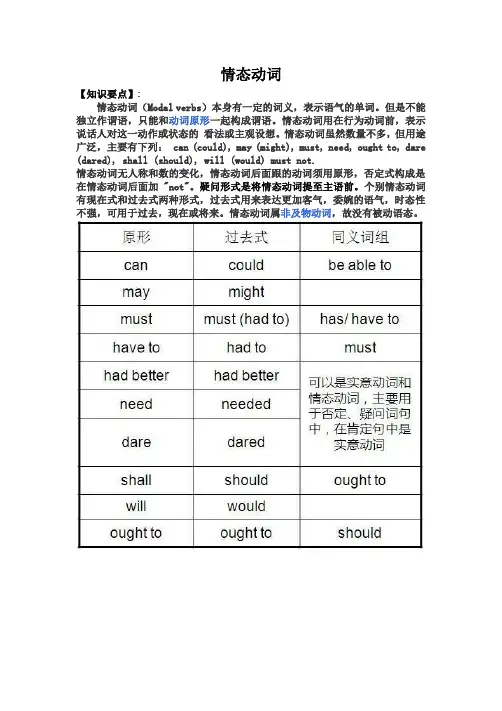
情态动词【知识要点】:情态动词(Modal verbs)本身有一定的词义,表示语气的单词。
但是不能独立作谓语,只能和动词原形一起构成谓语。
情态动词用在行为动词前,表示说话人对这一动作或状态的看法或主观设想。
情态动词虽然数量不多,但用途广泛,主要有下列: can (could), may (might), must, need, ought to, dare (dared), shall (should), will (would) must not.情态动词无人称和数的变化,情态动词后面跟的动词须用原形,否定式构成是在情态动词后面加 "not"。
疑问形式是将情态动词提至主语前。
个别情态动词有现在式和过去式两种形式,过去式用来表达更加客气,委婉的语气,时态性不强,可用于过去,现在或将来。
情态动词属非及物动词,故没有被动语态。
【典型例题】:【专题一】:can和could的用法【例1】Can you lift this heavy box?(体力)【解析】表示能力(体力、知识、技能)【练习】1.Mary speak three languages.(知识)2. you skate?(技能)此时可用be able to代替。
Can只有一般现在时和一般过去式;而be able to 则有更多的时态。
I’ll not be able to come this afternoon.当表示“经过努力才得以做成功某事”时应用be able to,不能用Can。
【例2】-----Can I go now?----- Yes, you can. / No, you can’t.【解析】表示请求和允许。
此时可与may互换。
在疑问句中还可用could,might 代替,不是过去式,只是语气更委婉,不能用于肯定句和答语中。
【练习】---- I come to see you tomorrow?---- Yes, you .----No, you /I’m afraid not.【例3】Can this be true?【解析】表示推测(惊讶、怀疑、不相信的态度),用于疑问句、否定句和感叹句中。
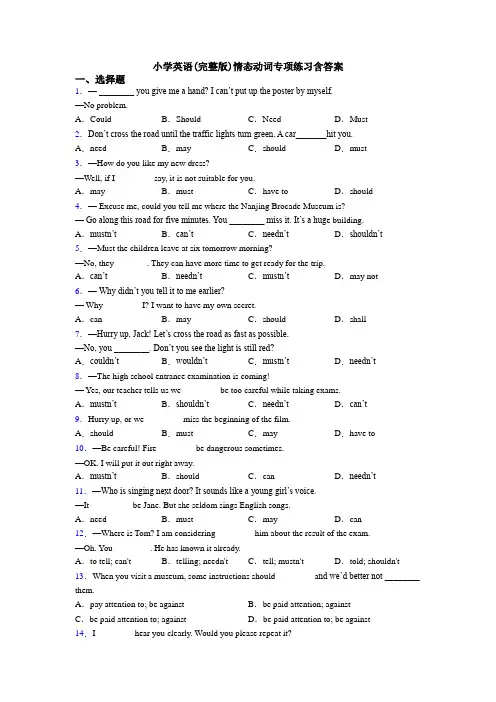
小学英语(完整版)情态动词专项练习含答案一、选择题1.—________ you give me a hand? I can’t put up the poster by myself.—No problem.A.Could B.Should C.Need D.Must2.Don’t cross the road until the traffic lights turn green. A car_______hit you.A.need B.may C.should D.must3.—How do you like my new dress?—Well, if I ________ say, it is not suitable for you.A.may B.must C.have to D.should4.— Excuse me, could you tell me where the Nanjing Brocade Museum is?—Go along this road for five minutes. You ________ miss it. It’s a hug e building.A.mustn’t B.can’t C.needn’t D.shouldn’t 5.—Must the children leave at six tomorrow morning?—No, they _______. They can have more time to get ready for the trip.A.can’t B.needn’t C.mustn’t D.may not 6.—Why didn’t you tell it to me earlier?— Why ________ I? I want to have my own secret.A.can B.may C.should D.shall7.—Hurry up, Jack! Let’s cross the road as fast as possible.—No, you ________. Don’t you see the light is still red?A.couldn’t B.wouldn’t C.mustn’t D.needn’t8.—The high school entrance examination is coming!— Yes, our teacher tells us we ________ be too careful while taking exams.A.mustn’t B.shouldn’t C.needn’t D.can’t9.Hurry up, or we ________ miss the beginning of the film.A.should B.must C.may D.have to10.—Be careful! Fire ________ be dangerous sometimes.—OK. I will put it out right away.A.mustn’t B.should C.can D.needn’t 11.—Who is singing next door? It sounds like a young girl’s voice.—It _________ be Jane. But she seldom sings English songs.A.need B.must C.may D.can 12.—Where is Tom? I am considering ________ him about the result of the exam.—Oh. You ________. He has known it already.A.to tell; can't B.telling; needn't C.tell; mustn't D.told; shouldn't 13.When you visit a museum, some instructions should ________ a nd we’d better not ________ them.A.pay attention to; be against B.be paid attention; againstC.be paid attention to; against D.be paid attention to; be against14.I ________ hear you clearly. Would you please repeat it?A.mustn’t B.can’t C.needn’t D.shoul dn’t 15.— Mom, must I clean my room now?— No, you ________. You can do it after dinner.A.needn’t B.mustn’t C.shouldn’t D.can’t16.A lot of online resources ________ be used either by teachers at school or parents at home. A.can B.should C.need D.must17.— Zoe, what do you think is the greatest advantage of shopping online?— At least I ______ spend much time going from shop to shop.A.shouldn’t B.can’t C.needn’t D.mustn’t 18.—Have you decided to take up teaching as career after graduation?—I ________ go abroad for further education instead. But it depends.A.must B.should C.may D.shall19.We’ve discussed every detail of this plan and have got everything ready. But still something __________ go wrong. We still have to be very careful.A.must B.should C.would D.may 20.—There is a knock at the door.—It ________ be my mom. She always comes back home at this time.A.may B.may not C.must D.can’t21.— The sandstorm in Beijing is so serious this year.— Yes, I wonder when we ________ worry about the air we breathe.A.can’t B.mustn’t C.needn’t D.shouldn’t 22.—Must I finish all my homework today, Mum?—No, you ________, my dear. You can finish some tomorrow if you like.A.needn’t B.shouldn’t C.can’t D.mustn’t23.We've discussed every detail of this plan and have got everything ready. But still something ________ go wrong. We still have to be very careful.A.must B.should C.would D.may24.—Is that Mr Zhou?—It ________ be him. He has gone to Beijing.A.can B.may C.can’t D.shouldn’t 25.Never throw objects from the building. Even a small object ________ cause serious injuries, or death, when dropped from a great height.A.must B.should C.may D.need26.—Will Jim come to Yangzhou for a holiday?—He ________come and it depends on how much homework he will have.A.may B.should C.must D.need27.You ________ pay too much attention to protecting yourself if you plan to go abroad. A.mustn’t B.can’t C.shouldn’t D.needn’t 28.—Shall I tell him the change of the time right now?—I’m afraid you ________, otherwise he will be late for the meeting.A.can B.may C.must D.need29.—I must go to school today, ________?—No, you ________.You can go as soon as you get well.A.mustn’t I;needn’t B.needn’t I;needn’tC.mustn’t I;mustn’t D.needn’t I;mustn’t30.Mr. Black ________ be at home now. He went abroad on vacation last Friday.A.can’t B.mustn’t C.needn’t D.shouldn’t31.You _________ smoke here! Look at the sign. It says "No smoking".A.needn't B.mustn't C.can D.may 32.—Could you tell me how to renew the library books?—With pleasure. You ________ come to our desk every time. It’s easier to renew them online. A.can’t B.mustn’t C.needn’t D.shouldn’t 33.—May I have some wine to drink?—No, you ________. You have to drive home later.A.mustn’t B.needn’t C.can’t D.may not34.—I think they are enough. We ________ make so many chairs.—I don’t think so. Because nearly a quarter of them need ________.A.don’t need to; mending B.needed; to be mendedC.don’t need; mend D.need; to mend35.You ________ be careful with the camera. It costs!A.can B.will C.should D.may 36.—Who’s singing next door? Is it Miss Wang?—It ________ be her. She’s having the board meeting.A.can’t B.shouldn’t C.mustn’t D.needn’t37.It’s of great importance to protect the environment. Each of us ________ take an active part in it.A.can B.may C.would D.should 38.Sorry, smoking is not allowed here. If you ________ , you will be fined according to the rules. A.can B.will C.may D.must 39.—Could I join you in the programme?—Sorry, you ________. You are too young.A.shouldn’t B.mustn’t C.can’t D.needn’t 40.—Will dad arrive home at 6 o’clock to have dinner with us this evening?— I think he will, but he ________ not. Sometimes he works extra hours.A.can B.must C.need D.may【参考答案】一、选择题1.A解析:A【详解】句意:——你能帮我一把吗?我一个人贴不起海报。

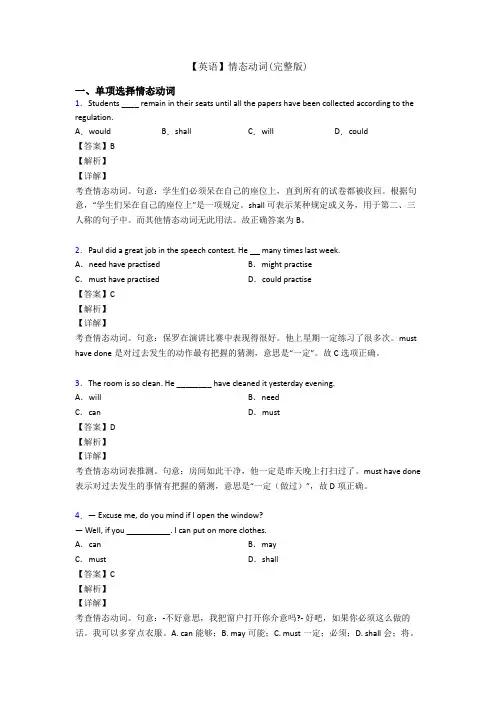
【英语】情态动词(完整版)一、单项选择情态动词1.Students ____ remain in their seats until all the papers have been collected according to the regulation.A.would B.shall C.will D.could【答案】B【解析】【详解】考查情态动词。
句意:学生们必须呆在自己的座位上,直到所有的试卷都被收回。
根据句意,“学生们呆在自己的座位上”是一项规定。
shall 可表示某种规定或义务,用于第二、三人称的句子中。
而其他情态动词无此用法。
故正确答案为B。
2.Paul did a great job in the speech contest. He many times last week.A.need have practised B.might practiseC.must have practised D.could practise【答案】C【解析】【详解】考查情态动词。
句意:保罗在演讲比赛中表现得很好。
他上星期一定练习了很多次。
must have done是对过去发生的动作最有把握的猜测,意思是“一定”。
故C选项正确。
3.The room is so clean. He ________ have cleaned it yesterday evening.A.will B.needC.can D.must【答案】D【解析】【详解】考查情态动词表推测。
句意:房间如此干净,他一定是昨天晚上打扫过了。
must have done 表示对过去发生的事情有把握的猜测,意思是“一定(做过)”,故D项正确。
4.— Excuse me, do you mind if I open the window?— Well, if you __________. I can put on more clothes.A.can B.mayC.must D.shall【答案】C【解析】【详解】考查情态动词。
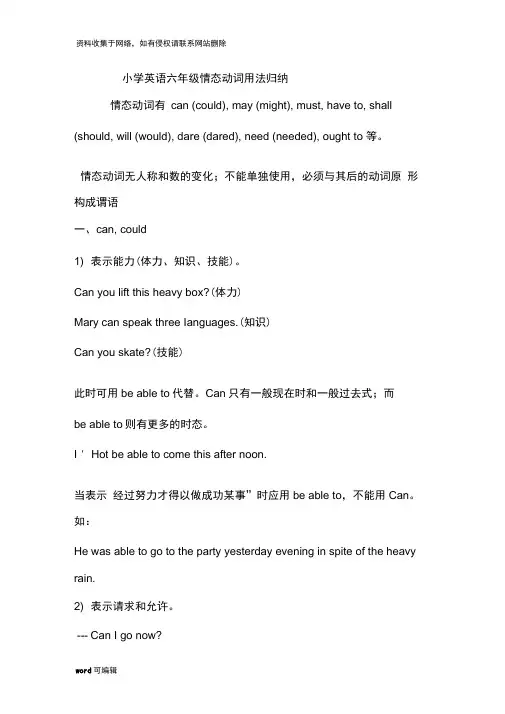
小学英语六年级情态动词用法归纳情态动词有can (could), may (might), must, have to, shall (should, will (would), dare (dared), need (needed), ought to 等。
情态动词无人称和数的变化;不能单独使用,必须与其后的动词原形构成谓语一、can, could1) 表示能力(体力、知识、技能)。
Can you lift this heavy box?(体力)Mary can speak three Ianguages.(知识)Can you skate?(技能)此时可用be able to代替。
Can只有一般现在时和一般过去式;而be able to则有更多的时态。
I ' Hot be able to come this after noon.当表示经过努力才得以做成功某事”时应用be able to,不能用Can。
如:He was able to go to the party yesterday evening in spite of the heavy rain.2) 表示请求和允许。
--- Can I go now?——Yes, you can. / No, you can' t.此时可与may互换。
在疑问句中还可用could,might代替,不是过去式,只是语气更委婉,不能用于肯定句和答语中。
——Could I come to see you tomorrow?----Yes, you can. ( No, I ' mfraid not.)3)表示客观可能性(客观原因形成的能力)。
They' vecha nged the timetable, so we can go by bus in stead.This hall can hold 500 people at least.4)表示推测(惊讶、怀疑、不相信的态度),用于疑问句、否定句和感叹句中。
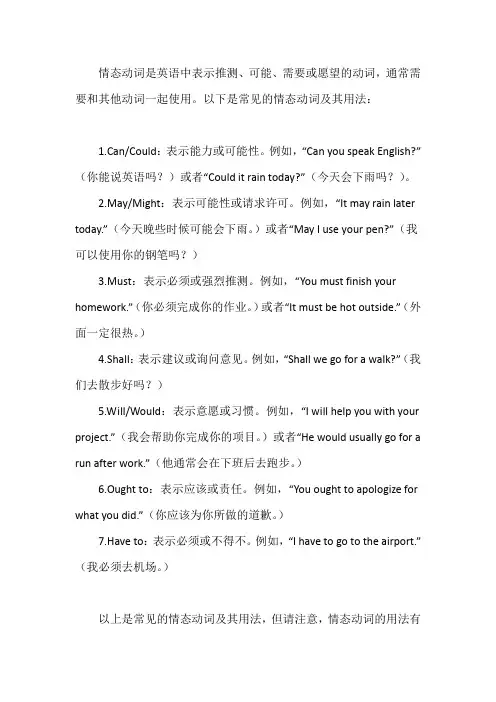
情态动词是英语中表示推测、可能、需要或愿望的动词,通常需要和其他动词一起使用。
以下是常见的情态动词及其用法:1.Can/Could:表示能力或可能性。
例如,“Can you speak English?”(你能说英语吗?)或者“Could it rain today?”(今天会下雨吗?)。
2.May/Might:表示可能性或请求许可。
例如,“It may rain later today.”(今天晚些时候可能会下雨。
)或者“May I use your pen?”(我可以使用你的钢笔吗?)3.Must:表示必须或强烈推测。
例如,“You must finish your homework.”(你必须完成你的作业。
)或者“It must be hot outside.”(外面一定很热。
)4.Shall:表示建议或询问意见。
例如,“Shall we go for a walk?”(我们去散步好吗?)5.Will/Would:表示意愿或习惯。
例如,“I will help you with your project.”(我会帮助你完成你的项目。
)或者“He would usually go for a run after work.”(他通常会在下班后去跑步。
)6.Ought to:表示应该或责任。
例如,“You ought to apologize for what you did.”(你应该为你所做的道歉。
)7.Have to:表示必须或不得不。
例如,“I have to go to the airport.”(我必须去机场。
)以上是常见的情态动词及其用法,但请注意,情态动词的用法有时会因语境而异,具体需要根据上下文来判断其含义。
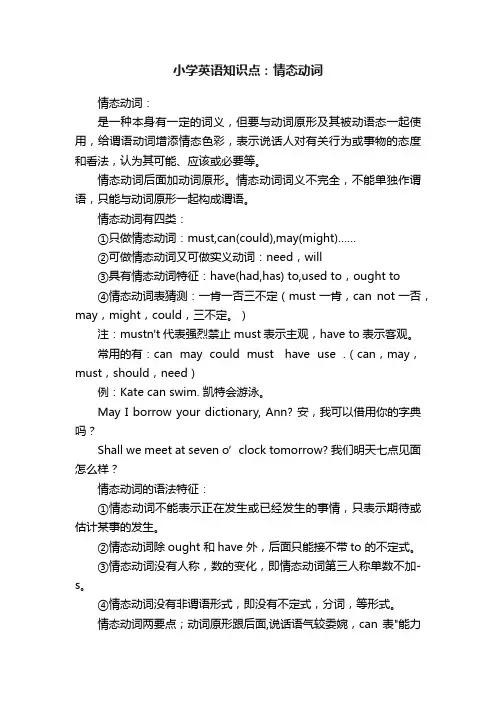
小学英语知识点:情态动词情态动词:是一种本身有一定的词义,但要与动词原形及其被动语态一起使用,给谓语动词增添情态色彩,表示说话人对有关行为或事物的态度和看法,认为其可能、应该或必要等。
情态动词后面加动词原形。
情态动词词义不完全,不能单独作谓语,只能与动词原形一起构成谓语。
情态动词有四类:①只做情态动词:must,can(could),may(might)……②可做情态动词又可做实义动词:need,will③具有情态动词特征:have(had,has) to,used to,ought to④情态动词表猜测:一肯一否三不定(must一肯,can not一否,may,might,could,三不定。
)注:mustn't代表强烈禁止 must表示主观,have to表示客观。
常用的有:can may could must have use .(can,may,must,should,need)例:Kate can swim. 凯特会游泳。
May I borrow your dictionary, Ann? 安,我可以借用你的字典吗?Shall we meet at seven o’clock tomorrow? 我们明天七点见面怎么样?情态动词的语法特征:①情态动词不能表示正在发生或已经发生的事情,只表示期待或估计某事的发生。
②情态动词除ought 和have 外,后面只能接不带to 的不定式。
③情态动词没有人称,数的变化,即情态动词第三人称单数不加-s。
④情态动词没有非谓语形式,即没有不定式,分词,等形式。
情态动词两要点;动词原形跟后面,说话语气较委婉,can表"能力"may"许可",must"责任"或"义务",否定回答"needn't"换;should"应该",would"愿",have to "被迫"表客观.注释:对must构成的一般疑问句作否定回答只能用needn't.比较can 和be able to:1.can/could 表示能力;可能(过去时用could),只用于现在式和过去式(could)。
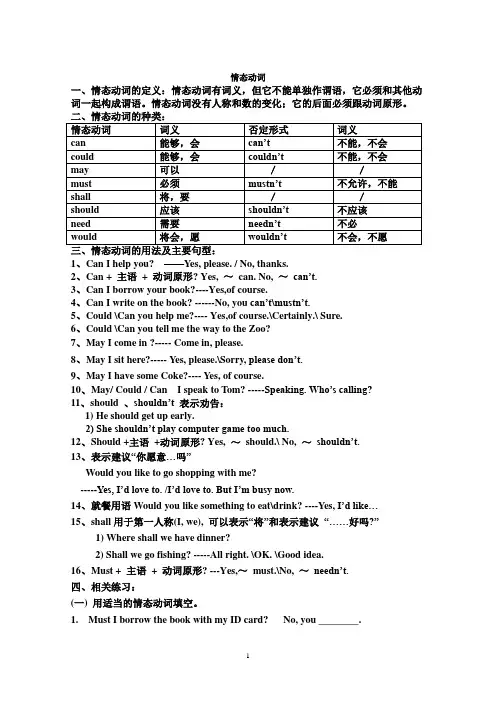
情态动词一、情态动词的定义:情态动词有词义,但它不能单独作谓语,它必须和其他动词一起构成谓语。
情态动词没有人称和数的变化;它的后面必须跟动词原形。
1、Can I help you? ——Yes, please. / No, thanks.2、Can + 主语+ 动词原形? Yes, ~can. No, ~can’t.3、Can I borrow your book?----Yes,of course.4、Can I write on the book? ------No, you can’t\mustn’t.5、Could \Can you help me?---- Yes,of course.\Certainly.\ Sure.6、Could \Can you tell me the way to the Zoo?7、May I come in ?----- Come in, please.8、May I sit here?----- Yes, please.\Sorry, please don’t.9、May I have some Coke?---- Yes, of course.10、May/ Could / Can I speak to Tom? -----Speaking. Who’s calling?11、should 、shouldn’t 表示劝告:1) He should get up early.2) She shouldn’t play computer game too much.12、Should +主语+动词原形? Yes, ~should.\ No, ~shouldn’t.13、表示建议“你愿意…吗”Would you like to go shopping with me?-----Yes, I’d love to. /I’d love to. But I’m busy now.14、就餐用语Would you like something to eat\drink? ----Yes, I’d like…15、shall用于第一人称(I, we), 可以表示“将”和表示建议“……好吗?”1) Where shall we have dinner?2) Shall we go fishing? -----All right. \OK. \Good idea.16、Must + 主语+ 动词原形? ---Yes,~must.\No, ~needn’t.四、相关练习:(一) 用适当的情态动词填空。
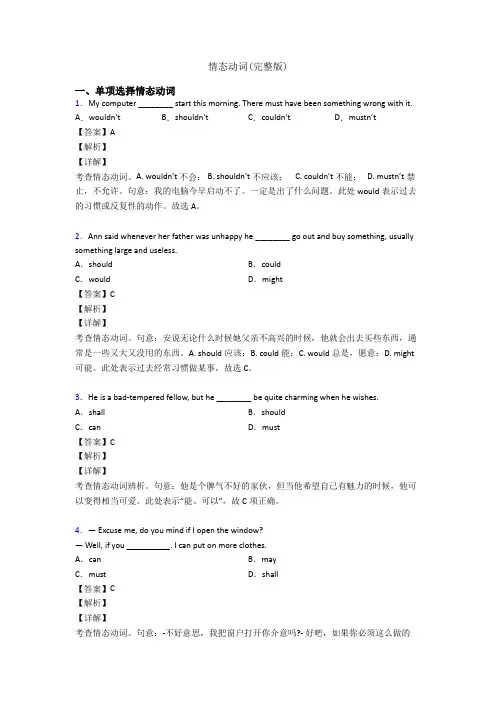
情态动词(完整版)一、单项选择情态动词1.My computer ________ start this morning. There must have been something wrong with it. A.wouldn’t B.shouldn’t C.couldn’t D.mustn’t【答案】A【解析】【详解】考查情态动词。
A. wouldn’t 不会;B. shouldn’t不应该; C. couldn’t 不能; D. mustn’t禁止,不允许。
句意:我的电脑今早启动不了。
一定是出了什么问题。
此处would表示过去的习惯或反复性的动作。
故选A。
2.Ann said whenever her father was unhappy he ________ go out and buy something, usually something large and useless.A.should B.couldC.would D.might【答案】C【解析】【详解】考查情态动词。
句意:安说无论什么时候她父亲不高兴的时候,他就会出去买些东西,通常是一些又大又没用的东西。
A. should应该;B. could能;C. would总是,愿意;D. might 可能。
此处表示过去经常习惯做某事,故选C。
3.He is a bad-tempered fellow, but he ________ be quite charming when he wishes. A.shall B.shouldC.can D.must【答案】C【解析】【详解】考查情态动词辨析。
句意:他是个脾气不好的家伙,但当他希望自己有魅力的时候,他可以变得相当可爱。
此处表示“能、可以”,故C项正确。
4.— Excuse me, do you mind if I open the window?— Well, if you __________. I can put on more clothes.A.can B.mayC.must D.shall【答案】C【解析】【详解】考查情态动词。
小学常考情态动词(can,must,should,might)及习题情态动词:情态动词本身具有一定的词义,表示说话人的某种语气或感情,但不能单独作谓语,通常要和行为动词一起构成谓语。
情态动词没有人称和数的变化,适用于所有人称,其后要接动词原形。
一、情态动词can的用法:1、其中情态动词can表能力时意为“能够做某事”,后接动词原形;否定形式为can't或cannot;can的过去式为could。
例:1.Tony can play basketball, but he can't play the piano.Tony会打篮球,但他不会弹钢琴。
2.Can Lily speak Chinese? —Lily会说中文吗?-Yes, she can. —是的,她会。
3.What can you do, Kate? —Kate,你会做什么?-I can play the violin. —我会拉小提琴。
2、其中情态动词can表许可或请求别人的许可时,意为“可以”,后接动词原形,相当于may,但may多用于正式、庄重的场合;can的否定形式为can't 或cannot。
例:You can go now if you like. 如果你想走,现在就可以走了。
-Mark, can I use your pen? —Mark,我能用下你的钢笔吗?-Of course. —当然了。
二、情态动词must表示“必须,应该,一定要”。
●∙主语是第一人称I或we时,表示说话人认为有必要或者有义务做某事;主语是第二、第三人称you、they、he、she等时,表示说话人要求或命令别人做某事。
●∙must的否定形式为must not,缩写为mustn't,意为“不许;严禁”。
●∙must引导的一般疑问句,肯定回答用must,否定回答用needn't或don'thave to,意为“不必”。
小学英语语法总结:情态动词我们现在学过的情态动词有:can, could, will, would, may, must, should, shall。
情态动词后动词总是用原形。
(不受其他任何条件影响)特征1)情态动词(modal verb)本身有词义,表示说话人的语气或情态,但词义不完全,不能单独用作谓语动词,一般只能和动词原形一起构成谓语动词。
2)情态动词所表示的情态有:命令、允诺、请求、拒绝、愿望、愿意、义务、必要、可能、水平、敢于、需要等。
3)情态动词(ought除外)和助动词shall,will,should,would一样,后面的动词不定式一般皆不带。
形式变化1)没有人称和数的变化,第三人称单数的现在时也无变化。
如:I can We canYou can You canHeThey canShe canIt2)有些情态动词有过去式,有少数过去式和它的原形相同。
a)有过去式的情态动词有:may -- wouldcan ―― couldmay―― nightshall -- shouldhave to -- had tob)过去式不变的情态动词有:must - must (或had to)ought to - ought toneed---needdare - dare(亦可用dared)3)绝大部分情态动词后面可用动词的实行式、完成式和被动形式,如:can(may,must)be doing,can(may,must) have done,can (may,must)be done等。
否定式情态动词和助动词一样,后面可直接跟否定词not。
现将情态动词的否定式及其否定式的简略式(简略式用于口语中)列举如下:shall not--shan‘t [FB:nt]will not---won’t [wEunt]can not-can‘t [kB:nt]must not-mustn’t [5mQsnt]should not-- shouldn‘twould not-- wouldn’tcould not-- couldn‘tdare not- daren’t [dZEnt]need not-- needn‘t在疑问句中的用法情态动词在疑问句中的用法和助动词相同。
小学三年级英语语法(一)情态动词cancan 在英语中有一个特殊的名字,叫做情态动词,表示“能够”, “会”, “能力”后面要跟着表示动作的动词。
没有时态和人称的变化。
表示不能做什么的时候,后面加上not为can not,或者缩写为can’t。
问别人“能…吗?”要把can 放在句子前面,首字母要大写,句尾别忘加上问号。
例句:—I can swing .I can draw.—She can jump.He can play .—We can touch .They can run.—I can’t sing.You can’t see.—She can’t dance.He can’t hear a car.—We can’t hear an aeroplane.—Can you hear a dog?Can he hear a bus?—Can Lucy write?Can you do it?将下面各组词组成句子1.________________________(an,aeroplane,hear,Lucy,can )2. ____________________________ (not,he ,dance,can )3.____________________________? (you,can ,see,what )4.____________________________(can ,see ,not ,we ,you)5._____________________________. (I ,can ,help ,you )6._____________________________? (I,can ,do,what)7._____________________________? (you ,can ,hear me)8._____________________________? (you ,can ,dance)答案:1. Lucy can hear an aeroplane. 2. He can not /can’t dance.3. What can you see?4. We can not /can’t see you5. I can help you.6. What can I do?7. Can you hear me? 8. Can you dance?(二)人称代词所属格. 人称代词表人称主格be动词及其否定形式所有格,形容性物主代词have/has及其否定形式助动词及其否定形式宾格单数第一人称我I am/am not my have/haven’tdo/don’tme 第二人称你you are/aren’tyour have/haven’tdo/don’tyou 第三人称他he is/isn’this has/hasn’tdoes/doesn’thim 她she is/isn’ther has/hasn’tdoes/doesn’ther。
小学四年级情态动词用法归纳情态动词是英语中一类特殊的动词,用来表达说话人对某种行为或状态的态度、能力或推测。
在小学四年级的英语学习中,掌握情态动词的用法对于提高语言表达能力至关重要。
下面将对小学四年级中常见的情态动词进行归纳和总结。
一、cancan是最常见的情态动词之一,表示某人能够做某事。
例如:1. I can swim.(我会游泳。
)2. She can speak English very well.(她英语说得很好。
)can还可以用于询问对方是否能够做某事,形成疑问句,例如:1. Can you play the piano?(你会弹钢琴吗?)2. Can I borrow your pen?(我可以借你的笔吗?)二、couldcould是can的过去式,表示过去某个时间或特定情境下的能力。
例如:1. When I was younger, I could run very fast.(我年轻时跑得很快。
)2. Could you help me with my homework?(你可以帮我做作业吗?)could还可用于表示礼貌的请求和询问,例如:1. Could you please pass me the salt?(请你把盐递给我好吗?)2. Could I ask you a question?(我可以问你个问题吗?)三、maymay表示允许、许可或推测,常用于询问、请求和征求意见。
例如:1. May I go to the restroom?(我可以去洗手间吗?)2. May I have a piece of cake?(我可以吃一块蛋糕吗?)may还用于表示推测或可能性,常用于疑问句。
例如:1. May it rain tomorrow?(明天可能会下雨吗?)2. May she be the winner?(她可能是获胜者吗?)四、mustmust表示必须、一定或坚定的推断。
(完整版)新版人教版小学六年级上英语情态动词表新版人教版小学六年级上英语情态动词表以下是新版人教版小学六年级上英语中的一些常见情态动词:1. Can- 表示能力、允许或请求- 例如:- I can swim.(我会游泳。
)- Can I go to the bathroom?(我可以去洗手间吗?)2. Could- 表示过去的能力、请求或礼貌提问- 例如:- When I was younger, I could run faster.(我年轻时跑得更快。
)- Could you please pass me the salt?(请你把盐递给我好吗?)3. May- 表示允许、请求或可能性- 例如:- You may leave the classroom now.(你现在可以离开教室。
)- May I have a glass of water, please?(我可以请你给我一杯水吗?)4. Might- 与 may 相似,表示可能性,但较少使用- 例如:- It might rain later, so don't forget your umbrella.(可能会下雨,所以别忘了带伞。
)5. Must- 表示必须或推测- 例如:- You must finish your homework before playing games.(你必须先完成作业再去玩游戏。
)- He's wearing a coat, so it must be cold outside.(他穿着外套,所以外面肯定很冷。
)6. Should- 表示建议或期望- 例如:- You should brush your teeth twice a day.(你应该每天刷两次牙。
)- He should apologize for what he said.(他应该为他说的话道歉。
)7. Would- 表示愿意、过去的惯或虚拟语气- 例如:- Would you like some tea?(你想喝点茶吗?)- When I was young, I would visit my grandparents every summer.(我年轻时每年夏天都会去看望我的祖父母。
英语情态动词(完整版)含解析一、选择题1.— Could you please clean your room?—_________. I’ll do it at once.A.Yes, sure B.Sorry, I can’t C.It doesn’t matter D.Here you are 2.—Jim seems to be in low spirits. ________?—No one liked his plan. All his efforts were useless.A.Guess what B.What about him C.So what D.What happened 3.—Here’s your change.—________A.My pleasure. B.Thank you. C.With pleasure. D.No problem. 4.—I plan to find a part-time job in the coming summer holiday.—________ It will be a totally different experience.A.See you later. B.You’d better not.C.I’m sorry to know that.D.That sounds like fun.5.—Oh, no! There isn't any salt left.—____________! I’ll buy some when I go into town.A.Good idea B.Go ahead C.Never mind D.Not at all6.—I thought I’d try to repair the car myself.— __________ ! You know nothing about the car.A.No way B.You can’t be serious C.I couldn’t agree more D.Don’t change a thing7.— I am so sorry to keep you waiting for such a long time.— ________.A.Please shut up B.It’s your m istake C.It doesn’t matter D.Don’t explain it 8.—It's a shame to ask you to lend me more money, but. . .— ______ . You really need money to keep on with your education.A.Don't be silly B.Forget it C.No way D.Don't mention it 9.—Amazingly, I've managed to finish the project by myself.—___________I told you it was easyA.With pleasure. B.Guess what? C.There you are! D.It doesn’t matter 10.--Would you like to go shopping with me on Saturday?-- . I have to help my mother with housework.A.I’m afra id not B.Take your timeC.Enjoy yourself D.That’s all right11.–This box is too heavy for me to carry upstairs.–__________A.You may ask for help B.I’ll give you a handC.Please do me a favor D.I’d come to help12.—I just got a message from Ms. Yang and she said she would come to our meeting this afternoon.— She always has good ideas.A.Why not? B.What a pity! C.Time is up. D.That’ll be very nice. 13.-Do you think the rain will stop tomorrow?-_____. It has rained for four days. It’s too wet everywhere.A.I hope not B.I don’t think soC.Don’t worry D.I hope so14.—I’m so sorry to keep you waiting for me so long.— ________!A.With pleasure. B.Don’t say so C.I don’t think so D.It doesn’t matter 15.—Would you please help me with my spoken English?—__________. First you should know practice makes perfect.A.That’s right B.No problem C.Quite well D.No, thanks 16.—Lucy, can you help me with my history?—________. I am good at it.A.With pleasure B.I’m afraid not C.Sorry, I can’t D.No way 17.—Sir, this is your order, two chicken hamburgers and a cup of coffee. ________—I’ll have them here.A.For here or to go? B.Something to drink? C.Anything else? D.Is that OK? 18.—I missed the basketball game last Saturday because I had an exam.—________, but it will be repeated on TV.A.Take it easy B.You are lucky C.That’s wonderful D.Never mind 19.—Why not take your son to watch the new film A Little Red Flower?—__________.A.Good idea B.No problem C.Good luck D.No way 20.—Do you like cartoons or scary movies?—_______. They can cheer me up.A.Yes, I do B.No, I don't C.Cartoons D.Scary movies 21.—I’m sorry I didn’t make it to your birthday party last night.— ________ I know you are busy recently.A.Why not? B.Don’t mention it.C.No way. D.That’s all ri ght. 22.—Excuse me, can you give me some water? The cup is empty.—________A.Go ahead. B.My pleasure C.At your service D.You’d better not. 23.—You seem so happy today, Jack.—________? I won the first prize in the singing competition yesterday.A.So what B.How come C.Guess what D.Why not 24.—I’m going hiking this afternoon. Would you like to go with me?—______, but I must finish my homework first.A.Sorry, I don’t B.That’s right C.I’d love to D.Not at all25.—I prefer western food. It’s delicious and goo d for us.—_______ ? But western food is said to be high in sugar and fat.A.Is that right B.How do you know thatC.Do you really think so D.Who told you that26.—Many people think women are better at cooking than men.—________. Most top chefs in the world are men.A.I agree B.I can’t agree more C.Not at all D.That’s not the case 27.—All of Mark Twain’s novels are popular.— ________. Especially The Adventures of Tom Sawyer.A.I can’t agree more B.That’s not the case C.That’s not the point D.Don’t mention it 28.—Could you help me look after my baby ________ I am away?—________.A.as; With pleasure B.while; My pleasure C.as; That’s all right D.while; With pleasure29.—Would you mind if I open the window?—_______.We need fresh air.A.Not at all B.Yes, of course C.You’d better not D.That’s all right 30.—Only those who have a lot in common can get along well.—________ Opposites sometimes attract.A.I think so. B.I don’t think so.C.I don’t care.D.I hope so. 31.—Only those who have a lot in common can get along well.—________. Opposites sometimes attract.A.I think so B.I don’t think so C.I don’t care D.I hope so 32.— Why will you take part in the charity walk? You are not good at running at all.— ________. I run to show that I can help others.A.Not exactly B.That’s not the point C.I can’t agree more D.It sounds like a pity 33.—Shall we go to the amusement park right away or the day after tomorrow?—________. Any time will do.A.Excuse me B.Have a good timeC.It’s up to you D.I’m afraid I can’t34.—How do you like coffee, Minnie?—It tastes very terrible. ________.A.I have no idea B.I don’t mind it C.I really can’t stand it D.I can’t afford it 35.— May I have a look at the newspaper China Daily?— Certainly. ________A.Thank you. B.It’s a pity.C.Here you are. D.I’d like to. 36.—________!—Yes. It sounds gentle and relaxing.A.How good the vegetable soup is B.How exciting the storybook isC.What nice music Ann is playing D.What a beautiful flower Jim keeps 37.—The game is too hard for me. I will certainly lose.—________. You should never say no before you try.A.Forget it! B.Come on! C.I’m sorry.D.Pardon me? 38.—I wonder if Tenny is doing well in her new school.—________. She is old enough to look after herself well.A.You’re welcome B.Good luck C.It’s a pity D.No need to worry 39.—Why don’t you join in a club to practise speaking English?—________.A.That’s a good idea B.Never mind C.Yes, please D.Thank you 40.—I’ll be away on a business trip. Would you mind looking after my cat?—Not at all. ________.A.It’s my pleasure B.I’d rather not.C.I’d like it.D.With pleasure. 41.— Wow, what a good smell! Can I have a piece of cake?— ________A.No way. B.Good idea! C.HeIp yourself. D.What a pity! 42.—Summer camping gives children the chance to live away from home.—________. It is always good to help children grow up.A.That’s true.B.Come this way. C.Let me have a look. D.I don’t think we agree.43.— Would you mind my turning on the TV? The New Year concert has just begun.— ________. Just go ahead.A.Ple ase don’t B.Better not C.Of course not D.I’m afraid not 44.—I visited the Purple Mountain Observatory by myself last Saturday.—________ Why didn’t you tell me earlier?A.You did? B.I hope not. C.Have a good time. D.I can’t believe it. 45.—Mum, Joe has broken a cup!—________. Accidents always happen.A.Pretty good B.Of course C.It doesn’t matter D.That depends 46.— The movie Lost in Russia sends a message about the importance of family.— ________. It reminds me of my parents.A.I hope so B.That’s all righ t C.You bet D.I don’t think so 47.— Are you feeling any better now after taking the medicine?—________. I’m feeling even worse.A.You got it B.Never mind C.Sorry to hear that D.Quite the opposite 48.—Another Friday! Let’s go to see the play tonight.—________ I will book the tickets online.A.My pleasure. B.That’s right.C.Why not? D.Never mind. 49.—Can I look at the menu for a few more minutes before I decide?—Of course. ________, Sir.A.Make yourself at home B.Enjoy yourself C.It doesn’t matterD.Take your time50.—How about putting some pictures into the report?—________ A picture is worth a thousand words.A.I don’t think so.B.Why not?C.Thank you. D.Don’t mention it.【参考答案】***试卷处理标记,请不要删除一、选择题1.A【解析】本题考查的是情景反应,要用客气婉转的回答方式。
小学英语情态动词 HEN system office room 【HEN16H-HENS2AHENS8Q8-HENH1688】小学英语教案——情态动词情态动词本身有各种意义,但不能单独作谓语,只能和主要动词一起构成谓语,表示说话人的语气和情态,这样的动词称为情态动词。
情态动词没有人称和数的变化。
常用的情态动词有can, could, may, might, will, would, should, must, need, dare等。
一、can, could的用法1. can的用法(1)表示能力、许可、可能性。
如:Can you speak English你会讲英语吗?Can you play the piano 你会弹钢琴吗?She can swim fast, but I can’t. 她能游得快,但我不能。
I can see with my eyes. 我用眼睛看。
(2)表示请求或者许可。
如:Can I help you我能帮助你吗?You can’t play baske tball. 你不能玩篮球。
Can you...“请你……好吗?”表示说话人的请求;Can I...“我可以……吗?”用来征求对方是否允许自己做某事。
如在句末加上 please一词就显得更有礼貌了。
例如:Can you help me, please 请你帮助我好吗?You can use my dictionary. 你可以用我的字典。
(3)表示推测,意为“可能”,常用与否定句和疑问句中,此时can’t译为“不可能”。
如:Can the news be true这个消息会是真的吗?The moon can’t always be full. 月亮不可能常圆。
2. could的用法(1)can的过去式,意为“能、会”,表示过去的能力、可能性或允许:如:He could write poems when he was 10. 他十岁时就会写诗。
I could run faster then.那时我能跑得更快。
It could be no better at that time.那时好得不能再好了。
(2)在疑问句中,表示委婉的语气,此时could没有过去的意思。
如:Could you do me a favour你能帮我个忙吗?二、may, might的用法1. 都表请求或允许,might可以指过去时间,也可指现在时间,语气更委婉。
如:You may take whatever you like. 你喜欢什么就拿什么。
May (Might) I ask for a photo of your baby 我可以要一张你宝宝的照片吗?May I come in我可以进来吗在回答以may引起的问句时,多避免用这个词,而用其它方式,如Y es, please. / Certainly. / Please don’t ./ You’d better not. / No, you mustn’t.等,以免显得太严峻或不客气。
2,表示可能。
I may be busy tomorrow. 我明天可能会比较忙。
Exercise1. -Is John coming by train--He should, but he __________ not. He likes driving his car.A. mustB. can?C. need?D. may2. Peter __________ come with us tonight, but he isn't very sure yet.A. must?B. can?C. may?D. will3. I thought you __________ be hungry, so I have brought you some cakes.A. may?B. might?C. can?D. could三、must, have to的用法1. 两词都是“必须”的意思,have to 表示客观的需要,must 表示说话人主观上的看法,即主观上的必要。
如:My brother was very ill, so I had to call the doctor in the middle of the night.我弟弟病得很厉害,我只得半夜里把医生请来。
(客观上需要做这件事)He said that they must work hard. 他说他们必须努力工作。
(主观上要做这件事)2. have to有人称、数、时态的变化,而must只有一种形式。
如:He had to look after his sister at home yesterday. 昨天他不得不在家照看妹妹。
3. 在否定结构中:don't have to 表示“不必”mustn't 表示“禁止”,如:You don't have to tell him about it. 你不一定要把此事告诉他。
You mustn't tell him about it. 你一定不要把这件事告诉他。
—Must I finish the homework right now?我现在必须完成家庭作业吗?—Yes, you must. / Yes, you have to. 是的。
(—No, you needn’t. / No, you don’t h ave to. 不,不必。
)4. must be+表语,表示推测,它的否定和疑问形式用can代替must。
如:This must be your pen. 这个一定是你的钢笔。
Your sister must be a doctor in this hospital. 你姐姐一定是这家医院的医生。
Exercise1. Come on! We __________ hurry because there isn't much time left.A. may?B. must?C. can?D. need2. Amy did best in the English test. She __________ hard last week.A. must have been working?B. should have worked?C. should work?D. must work.四、should的用法(1)用来提供帮助、提出建议,要求对方给出意见。
如:Should I help you with the community affairs我可以帮你做一些社区事务吗?Should we clean the classroom now 现在我们可以打扫教室吗?(2)表达义务、职责等。
如:I think today’s children should really learn to respect their elders. 我认为今天的孩子应该好好学习尊敬长辈。
You should (= ought to ) tell your mother about it at once. 你应该立即把此事告诉你妈妈。
He should work harder. 他应该更加努力。
You should help your mother with the housework. 你应该帮你母亲做家务。
例. Look out! The knife is very sharp. You ______ cut your finger.A. needB. mustC. shouldD. may五、will, would的用法1. 表示“将、将要、自愿做…”等。
如:People will die without air or water. 人离开水和空气将会死的。
I will do my best. 我将会尽力而为。
2. would like; Would like to do = want to 想要,为固定搭配。
如:Would you like to go with me? 你想和我一起走吗?3. Will you…Would you like…表示肯定含义的请求劝说时,疑问句中一般用some, 而不是any。
如:Would you like some cake你想要一些蛋糕吗?Exercise 51. ______ I know your name?A. MayB. WillC. ShallD. Must2. What kinds of homes will we live in the futureNobody ______ be sure, but scientists are working out new ideas now.A. willB. mayC. canD. must六、had better的用法表示“最好”,相当于一个助动词,只有一种形式,后面要跟动词原形,否定词形式为had better not。
如:It is pretty cold. You’d better put on my coat. 天很冷,你最好把我的大衣穿上。
You had better go now你最好现在就走He'd(=He had) better do it now他最好现在做She'd better not cry她最好别哭例. You ____ your tooth pulled out before it rot completely.A. had better gotB. had to get betterC. had better to getD. had better get。